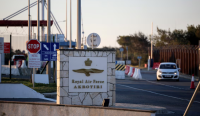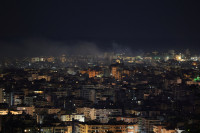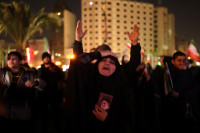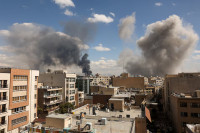World
In talks with Zelenskiy, Trump appears to press pause on fresh support
The Ukrainian leader was frank, telling Trump that Ukraine has thousands of drones ready for an offensive against Russian targets, but needs American missiles.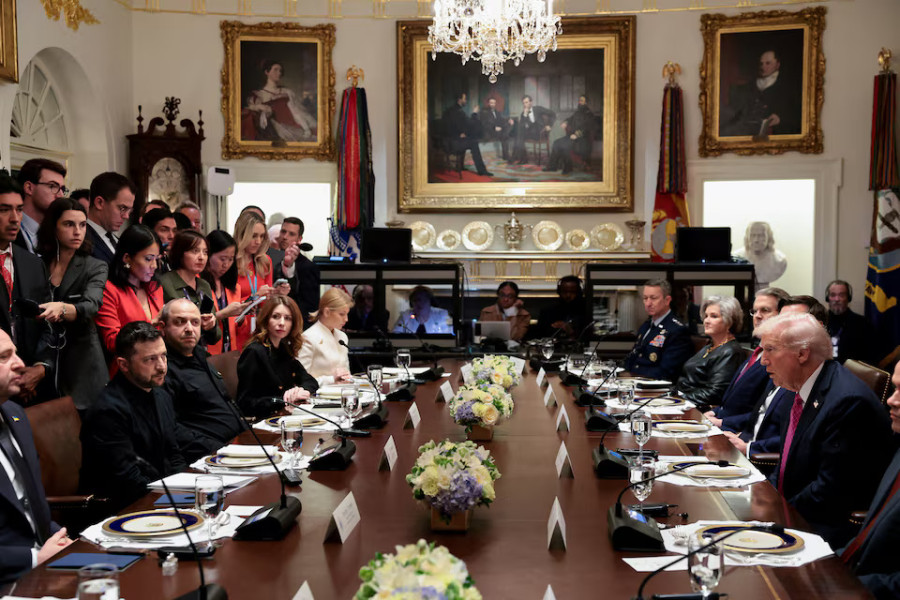
Reuters
Ukrainian President Volodymyr Zelenskiy came to the White House on Friday looking for weapons to keep fighting his country’s war with Russia, but met an American president who appears more intent on brokering a peace deal than upgrading Ukraine's arsenal.
While US President Donald Trump did not rule out providing the long-range Tomahawk missiles Zelenskiy seeks, Trump appeared cool to the prospect as he looked ahead to a meeting with Russian President Vladimir Putin in Hungary in the coming weeks.
After speaking with Zelenskiy for more than two hours, Trump implored both Ukraine and Russia to "stop the war immediately," even if it means Ukraine conceding territory.
"You stop at the battle line, and both sides should go home, go to their families," Trump told reporters on his way to his home in West Palm Beach, Florida. "Stop the killing. And that should be it. Stop right now at the battle line. I told that to President Zelenskiy. I told it to President Putin."
Trump's move to re-engage with Putin, a strategy that has frustrated Zelenskiy and some European allies in the past, cast a shadow on the US president's otherwise cordial exchange with his Ukrainian counterpart as they spoke with reporters ahead of a private lunch.
The two leaders then went behind closed doors where they also discussed a call the previous day between the Russian president and Trump, who has portrayed himself as a mediator between the warring forces despite the fact that Russia invaded Ukraine in 2022.
'GET ALONG A LITTLE'
"I think President Zelenskiy wants it done, and I think President Putin wants it done. Now all they have to do is get along a little bit," Trump told reporters.
Zelenskiy, however, noted how difficult it has been to try to secure a ceasefire. "We want this. Putin doesn't want (it)," he said.
The Ukrainian leader was frank, telling Trump that Ukraine has thousands of drones ready for an offensive against Russian targets, but needs American missiles.
“We don't have Tomahawks, that's why we need Tomahawks,” he said.
Trump responded: "We'd much rather have them not need Tomahawks."
Later, Trump reiterated that he wants the United States to hold onto its weaponry. "We want Tomahawks also. We don't want to be giving away things that we need to protect our country," he said.
After the meeting, which Zelenskiy described as productive, he told reporters he did not want to talk about long-range missiles, saying the US did not want escalation, and that he was "realistic" about his chance of getting them.
The Ukrainian president, who spoke by phone with European leaders after the meeting, said he was counting on Trump to pressure Putin "to stop this war."
When asked about Trump’s comments, Zelenskiy said: "President (Trump) is right, and we have to stop where we are. This is important, to stop where we are, and then to speak."
BACK TO THE TABLE
It was unclear what Putin had told Trump that prompted him to agree to the upcoming meeting. Their August summit in Alaska ended early with no major breakthrough.
The Kremlin said much needed to be decided and that the summit might take place "a little later" than within the two-week period mentioned by Trump.
Trump's conciliatory tone after the call with Putin raised questions over the near-term likelihood of assistance to Ukraine and reignited European fears of a deal that suits Russia. A spokesperson for the European Union said it welcomed the talks if they could help bring peace to Ukraine.
Trump was asked on Friday whether he was concerned Putin might be "playing" him for time by agreeing to talks.
"You know, I've been played all my life by the best of them, and I came out really well, so it's possible," Trump replied.
Michael Carpenter, a former U.S. official who is now a senior fellow at International Institute for Strategic Studies, said the meeting with Trump was not what Zelenskiy had been hoping for but was in line with the administration's approach to the war.
"The underlying reality is that there is no inclination to impose costs on Russia," he said.
The president expressed affection for Zelenskiy, at one point praising him for wearing what Trump called a "very stylish" dark suit jacket after he was knocked earlier this year for visiting the White House without one.
"He looks beautiful in his jacket," Trump said. "I hope people notice."
WAR HAS INTENSIFIED
Trump, who has campaigned for the Nobel Peace Prize, is eager to add to the list of conflicts he says he has been instrumental in ending.
More than 3-1/2 years after its full-scale invasion of Ukraine, Russia has made some territorial gains this year, but Ukraine's top military commander Oleksandr Syrskyi said on Thursday that the Russian offensive had failed.
Putin this month said his forces had taken almost 5,000 square kilometres (1,930 square miles) of land in Ukraine in 2025, equivalent to adding 1% of Ukraine's territory to the nearly 20% already held.
Both sides have also escalated attacks on each other's energy systems, and Russian drones and jets have strayed into NATO countries.
ANALYSTS SEE TALKS AS DELAYING TACTIC
The White House had seemed in recent days to be increasingly frustrated with Putin and leaning toward granting Zelenskiy fresh support, including the Tomahawk missiles that Ukrainians say would help them inflict more damage to Russia's war machine.
After Friday's talks, Zelenskiy said Russia was "afraid" of Tomahawks. Moscow has warned that supplying such missiles would mark a serious escalation.
Putin's move appeared meant to make the US transfer of such weapons less likely, said Max Bergmann, a Russia expert at the Center for Strategic and International Studies.
Mykola Bielieskov, a senior analyst at Come Back Alive, a Ukrainian non-governmental organization that is a major procurer of military equipment for the Ukrainian armed forces, said Tomahawk missiles would level a playing field that is tipped toward Russia.
"We don't expect Russia to crumble after one, two or three successful strikes," Bielieskov said. "But it's about pressure, constant pressure. It's about disrupting the military-industrial complex."




 9.89°C Kathmandu
9.89°C Kathmandu
